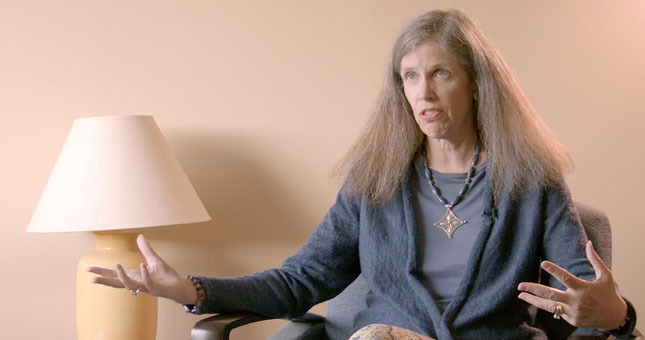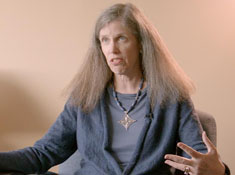
Duncan Ris
Building Temples with Our Ears
An Interview with Susan Phillips
“What I need more than anything while I’m here is to learn how to pray.” I remember this thought resounding through the caverns of my heart as I sat in orientation on my first day at Regent College. Here I was, ready to dive into the depths of theological studies where I knew intellectually dwelled a God of love. But I had no idea how to approach this God in a personal way.
Over the next year, my friends and professors would introduce me to the liturgy and the deep meaning of the sacraments where I would learn to encounter a present God. I discovered how to pray with the vast tradition of Christians guiding me, at the Table with bread and wine and the real presence of Jesus. This is the experience of many who find their way to Regent College.
I sit down with Susan Phillips—Executive Director of New College Berkeley, sociologist, and spiritual director—on a beautiful day in Vancouver, shortly after her summer class on Contemplative Listening.
“Scripture calls us to hear,” she tells me. “God calls us to hear. At the transfiguration, God says, ‘Listen and understand.’ We don’t do enough of that in our prayer lives or in our attention to others, nor do we adequately have practices of listening to what’s going on deeply in our own souls.”
She strikes a cord and I realize how distracted I am. Interviewing a professor on the art of listening, and here I am fumbling through my notes trying to plan what questions to ask next while I let her words float into a recorder for later. I realize how much of my life is lived this way.
“When we open our hearts before God,” she continues, “we’re more in touch with what’s deep in ourselves and better able to have our hearts open to other people. But too often, we’re in a posture of forward thrust, of what we’re going to say and do next. We don’t move into a receptive posture. Our culture doesn’t really allow us to.”
This is the grave problem we all face. Susan articulates it well: “There is a fragmentation of attention. Our devices enable us to do several things at once. It’s very efficient, but that keeps us in a more shallow place.”
The Shallows. Susan directs me to Nicholas Carr, author of The Shallows: What the Internet Is Doing to Our Brains. In the first chapter, Carr explains what I think might be the greatest threat to encountering a present God: “What the Net seems to be doing is chipping away my capacity for concentration and contemplation. Whether I’m online or not, my mind now expects to take in information the way the Net distributes it: in a swiftly moving stream of particles. Once I was a scuba diver in the sea of words. Now I zip along the surface like a guy on a Jet Ski.”
Susan tells me one of her favourite definitions for contemplation is from Walter Burghardt who describes it as “the long, loving look at the real.” She says it forces us to stop, to hold a space, to pay attention to the real—whatever the real happens to be. “Contemplative also has the word temple in it. The temple is that space in which we hope to encounter God.” This is where I can see Susan’s expertise as a spiritual director take shape. Her kind, attentive eyes and carefully chosen words show she’s had years of practice “holding the space,” her ears building temples as she listens to God and those whom God loves. She tells me about her journey with spiritual direction. “It was the mustard seed that I swallowed and it grew and grew.” She approached spiritual direction not as a theologian, but as a sociologist curious about the listening arts. “I was interested in how our well-being, mental health, and mental illness are shaped by cultural currents. As a Christian, I was wondering how to understand that in terms of my faith.” As Susan journeyed into the complexities of human experience, she wanted to know, “What does the church do for the care of souls?” It was in searching for the answer to this question where she found a practice that had been around for centuries—spiritual direction.
After researching the practice, Susan felt God calling her to receive spiritual direction. “It was a remarkable experience to have someone interested in my prayer life, someone who wanted to hear how I was doing in my relationship with God. That made me attend more to those things.” Her vocational journey would not only lead her to receive spiritual direction, but to be trained as a spiritual director herself, eventually writing a book on the subject and becoming a supervisor for directors. “I thought it was primarily one of God’s ways of getting me to pray more,” she says, “and then it turned out it was a part of my calling.”
I ask her about some of the most common struggles she sees as a spiritual director. She tells me without hesitation: “People really do want to know how to pray. People can be very involved in church life and Christian activities, and yet feel a certain barrenness in their prayer life. They want a place where they can talk openly about that, maybe broaden their understanding of what constitutes prayer, and also have permission to pray honestly. The Psalms as the prayer book for Christians should give us permission to pray honestly, but we still can be part of traditions or have our own way of thinking about prayer that prevents us from being open with lament, with questions, and with anger.”
As she says this, I feel the profound weight of my revivalist heritage—all the dishonest prayers, the phony phrases, and the incomplete language. I realize the liturgy has made space for me to confess, to mourn; the liturgy has brought me closer to the Psalter. And so we begin talking about high-church spirituality.
“I’m all for practices that help us slow down, open our hearts, and turn toward God. And certainly the liturgy and the sacraments can help us do that,” Susan says. “High-church spirituality came out of people wanting more of those kinds of practices. When I was a child, there was a cultural Sabbath. Stores weren’t open and people didn’t go to soccer practice. There was more of a pause. I went to an episcopal church that today is very high church, but when I was there, it wasn’t so much. It didn’t have icons. It didn’t have incense. Now it does, because I think more and more in our pressing lives, we need things that help us slow down. Moving into a more embodied spirituality that engages the senses enables us to do that.”
With these words, Susan captures my recent spiritual narrative and the narrative of so many of my friends. She has also pulled the strings of one of the most neglected disciplines in the church—Sabbath.
“I really only began to take Sabbath seriously about fifteen years ago,” Susan tells me. “It was the only one of the Ten Commandments that I somehow viewed as a suggestion.”
She talks about how Sabbath, meaning to stop, or cease in Hebrew, is hugely countercultural. “Initially, it was very difficult to enter into Sabbath. I’m very enthusiastic about my work, so to put it down felt like loss, but now it feels like freedom. Sabbath makes me aware of God in a way I’m not aware of ordinarily. It’s like entering a space of just being and playing with God. It’s truly refreshing.”
Susan keeps Sabbath from sundown Saturday to sundown Sunday. “I think the Jewish wisdom of linking it to the movement of the sun is very wise. The rest of my disciplines I have to hold the space and time for, but it’s wonderful to have a spiritual discipline that arrives on its own—I can receive it or not—but it arrives regardless.”
I push back, only a little. If we’re honest, Sabbath tends to be one of those marks of spirituality that is wonderful in theory, but grueling to actually put into practice. Susan explains: “It’s important to notice what helps you be in Sabbath and what interferes with it. So, for some people, cooking is totally compatible with Sabbath. It’s not work; it’s play. That’s not the case for me. For other people, gardening is totally compatible with Sabbath. For me, a perfectionism can get hooked that doesn’t feel in line with Sabbath. So I’ve gradually learned what helps me stay in that free, receptive posture.” She adds, “I think the law of Sabbath is meant to be held in community. Some communities do manage that, but I think we’re generally more in a place where people—if they observe Sabbath—are doing it on their own.”
Sabbath, Susan notes, has also suffered from our consumerist habits. She says, “I think we are asked to move out of instrumentality. Aristotle and also some Jewish rabbis wrote about Sabbath as a good thing because it gives you rest so you’re better able to work the other days of the week. This is not what God says. Sabbath itself is the good. Sabbath itself is the gift.” This is what Susan calls, “The wonderful freedom of it.” “Sabbath wasn’t something instrumental. It was simply this free zone of being with God, not for the sake of any kind of gain.” When we turn away from everyday distractions during Sabbath, we’re not so much concerned with the relief that comes with their absence as much as the profound gift of what we’re turning towards—an encounter with a present God.
I begin to lose track of time as Susan and I delve deeper into discussing Sabbath, my fear of vacuous silence, a holistic view of spiritual discernment, and holding a time and place for listening to God through Scripture. In talking with Susan, I realize how far I’ve come since Regent College orientation, how much I’ve learned about prayer, and yet how far I still have to go.
“I’ve always encouraged people to start small,” Susan says after my yearning for some practical advice. “Small changes. Experiment with a spiritual discipline. See if it’s helpful. The best way to add a spiritual discipline in your life is to attach it to something that already exists. So, as you brush your teeth in the morning, add a short lectio prayer with Scripture. And once you have a discipline established, you can expand it a bit.”
Susan and I continue to talk about our hopes that Christians might be known as the good listeners of the world, as people who can build temples with their ears, having a heart so focused on the Father and those whom he loves.





